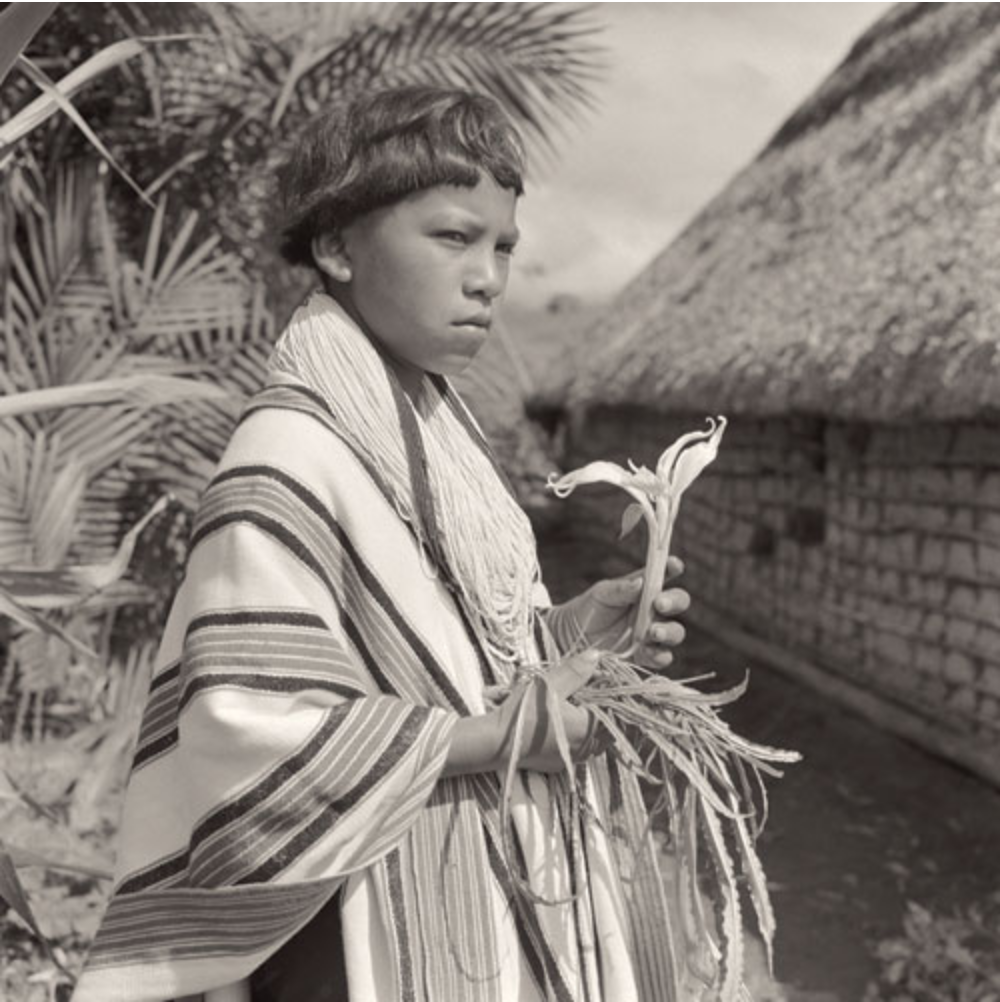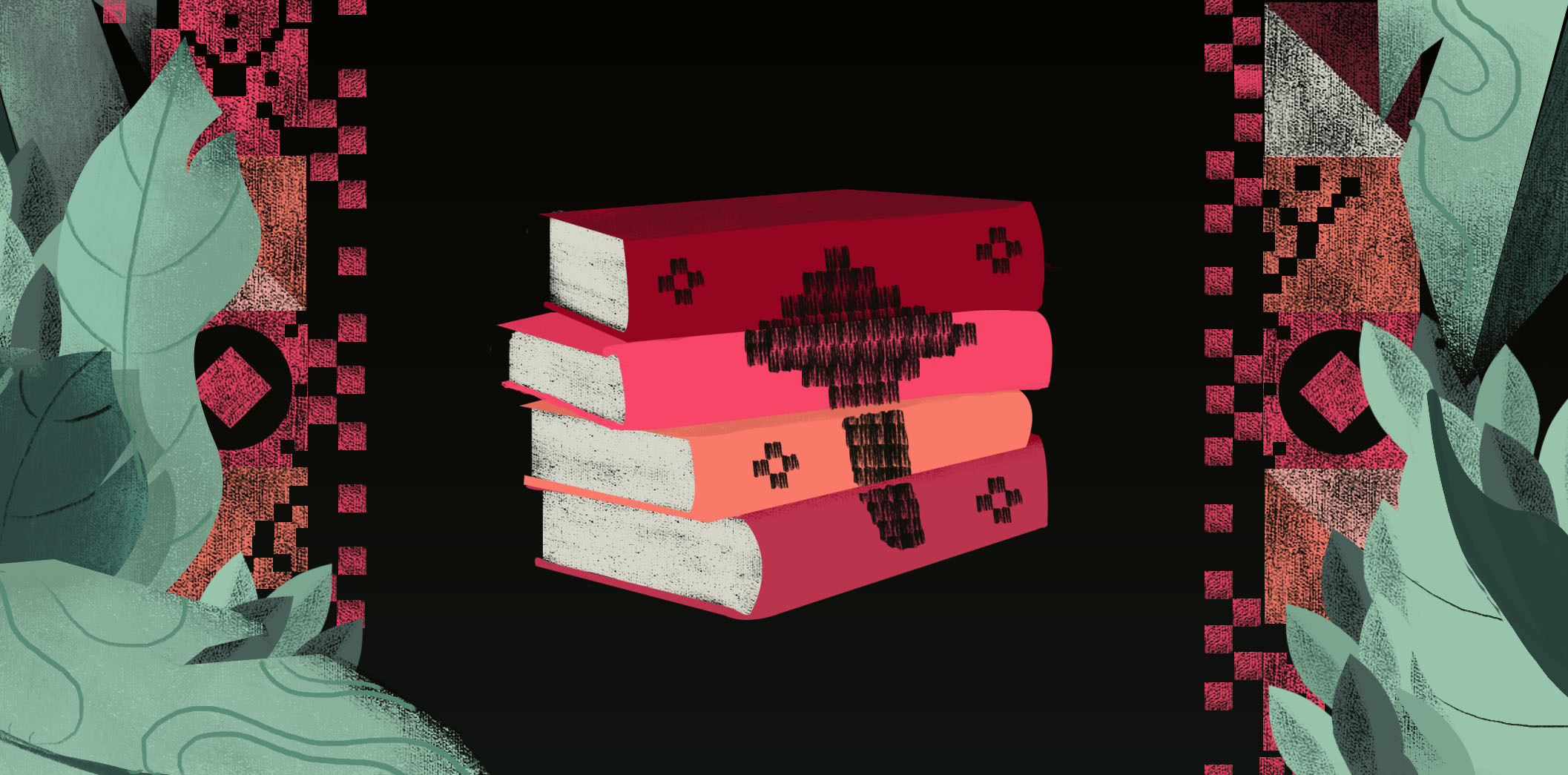I imagine the day when famed Harvard ethnobotanist Richard Evans Schultes came upon the Sibundoy Valley and the interaction that he had with Salvador Chindoy when he took a picture of Salvador’s nephew holding a Brugmansia flower. This became a memorable image in Plants of the Gods, a foundational text for many Westerners about botanical psychedelics. Schultes would later become a major contributor to expanding awareness about yagé, or ayahuasca.
Similarly, I imagine that day in Huatla de Jiménez, Mexico, when Gordon Wasson and his wife Valentina Pavlovna, amateur ethnomycologists, met Maria Sabina for the first time and discussed the healing powers of los niños santos. She allowed Wasson to take her picture and asked him not to print it, but he did anyway. Life magazine later featured the story and with that, the magical powers of psychedelic mushrooms became known to the rest of the world.
We may consider these both origin stories of the psychedelic movement as it exists today. Of course, there are many others, but these are definitely among them. Many other scholars, scientists, and seekers followed in the footsteps of Schultes, Wasson, and Pavlovna and the knowledge—which had been safeguarded for generations among the humble confines of indigenous communities—became the foundation for an entire cultural movement.
As is common in periods of advancement and breakthroughs throughout history, the glory that prevails in one area often exists alongside gaping inequity and profound loss in other areas.
The newest rendition of this is more commonly referred to as the “modern psychedelic renaissance.” As is common in periods of advancement and breakthroughs throughout history, the glory that prevails in one area often exists alongside gaping inequity and profound loss in other areas.
Indigenous and traditional plant medicine communities are suffering, and some are on the very real verge of complete extinction, due to the multi-generational impact of systematic colonialization and genocide.

In this case, the movement is not to blame, per se, nor may we consider it a direct transgression of malintent or conscious colonialization. However, at pivotal moments, such as the one we are now living in, we may embrace a simple invitation to reflect upon the current state of affairs. Indigenous and traditional plant medicine communities are suffering, and some are on the very real verge of complete extinction, due to the multi-generational impact of systematic colonialization and genocide. This is a true and simple fact.
In both Sibundoy, Colombia and Huatla, Mexico, the Kamentsa and the Mazatec are living examples of communities facing very real challenges. These communities are some of the original stewards of psychedelic medicinal plants and fungi, and yet they have benefited very little from the current expansion of interest in psychedelic medicines throughout North America and Europe. While millions and millions of dollars are poured into research and commercialization, the communities where these sacraments originate are severely threatened in multiple ways. Traditional culture and language are being lost, traditional land is being encroached upon by development interests, abject poverty is rampant, and their governments do not offer sufficient support nor adequate resources.
To get a more specific sense of the scale, Compass, a mental healthcare company interested in psilocybin research for treatment-resistant depression, recently announced that they raised 80 million dollars, thus creating a total of 116.2 million raised in 3 rounds of funding. There are many companies like Compass that are rapidly entering the psychedelic space. Sadly, all of these endeavors have at least one aspect in common: They all lack of any clear channel for reciprocity toward indigenous and traditional communities where these practices originate.
The reality is that the majority of pioneers in the field of psychedelic research, commercialization, and medicalization benefitted in some way from the knowledge base that came from indigenous and traditional practices of using plant sacraments
This story is not new. What can be new is how this story unfolds going forward, and how the psychedelic movement at large can consider an approach of engaging in meaningful reciprocity by honoring the roots upon which the movement originates. The reality is that the majority of pioneers in the field of psychedelic research, commercialization, and medicalization benefitted in some way from the knowledge base that came from indigenous and traditional practices of using plant sacraments.
The very protocols that exist today draw upon many of the perspectives and insights that leaders in the field experienced while engaging with these substances, either directly with indigenous communities or in so-called “underground” settings. These insights and healing experiences, in addition to traditional perspectives on how to use these substances for healing purposes, were often foundational in directing inspirations toward psychedelic research and funding. There is nothing inherently wrong with this; though, if there was ever a time to look at this honestly and value the importance of reciprocity, that time is now. It’s possible to write a new narrative of a Western movement that engages in meaningful reciprocity with indigenous culture, cherishing the roots that allowed it to flourish.

We may consider honoring the very principles that psychedelics so often teach us; namely, the significance of our interconnection and the importance of reciprocity.
Indigenous and traditional plant sacrament communities that have stewarded this sacred knowledge for so long need our engagement—not with an arrogant savior mentality, typified by an attitude that they require our help in the form of pity or charity. Rather, this is about an act of solidarity and social responsibility. Indeed, we are in a true psychedelic renaissance. The potential for these sacraments and substances to positively impact humanity as a whole and help alleviate human suffering is nothing short of awe-inspiring. At the same time, we may consider shifting the ethical compass in the movement at large to one of more balance. We may consider honoring the very principles that psychedelics so often teach us; namely, the significance of our interconnection and the importance of reciprocity.
We must be honest and sincere about the true need for meaningful impact by way of supporting long-term sustainability, long-term resiliency, and long-term relationship building.
Directly supporting initiatives that engage in meaningful reciprocity is a great way for individuals, foundations, and businesses to be part of the change. Supporting projects that are indigenous-led or facilitated by individuals that have long-standing relationships in indigenous and traditional plant medicine communities is a great step. We must be honest and sincere about the true need for meaningful impact by way of supporting long-term sustainability, long-term resiliency, and long-term relationship building. Now is the time to bridge good intentions with action. Now is the time to consider that supporting this effort is not about a one-time charitable donation but, rather, about investing in and actively creating a world that we want our children to live in; a world that respects diversity, equity, balance, and reciprocity.
Please go to this page to check out specific projects that reflect these values. Yes! You, your organization, and your business can all join with Chacruna and be part of the psychedelic reciprocity renaissance, right now!
Art by Karina Alvarez.
Take a minute to browse our stock:
Did you enjoy reading this article?
Please support Chacruna's work by donating to us. We are an independent organization and we offer free education and advocacy for psychedelic plant medicines. We are a team of dedicated volunteers!
Can you help Chacruna advance cultural understanding around these substances?














